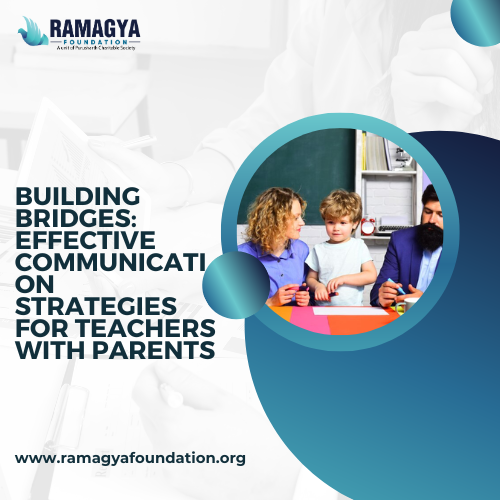
Effective communication is the cornerstone of any successful educational partnership. At Ramagya Foundation, we recognize communication’s pivotal role in bridging the gap between teachers and parents, mainly when working with underprivileged students. We’ll explore invaluable strategies for teachers to foster meaningful conversations with parents, ensuring every child receives the support and guidance they need to thrive.
- Open and Welcoming Approach
Effective communication begins with a warm and inviting demeanor. Teachers should create an environment where parents feel comfortable approaching them.
“A warm smile is the universal language of kindness.”
An open and welcoming approach is the foundation of effective communication. Teachers greeting parents with a friendly and inviting demeanor sets the tone for a positive and constructive dialogue. Parents should feel their concerns and insights are valued, creating a partnership between the school and home. - Regular Updates
Regular updates on a student’s progress are essential. According to a survey by the National Center for Education Statistics, 94% of parents believe that receiving regular updates on their child’s performance is necessary.
In today’s fast-paced world, timely and consistent communication is crucial. Regular updates on a student’s academic performance, behavior, and engagement in school activities provide parents with a clear picture of their child’s progress. This transparency fosters trust and informs parents about their child’s educational journey.
The National PTA reports that ongoing communication between teachers and parents increases family involvement in a student’s education. - Two-Way Listening
Communication is not just about speaking; it’s also about active listening. Teachers should allow parents to express their concerns, questions, and suggestions.
As Stephen R. Covey once said, “Most people do not listen with the intent to understand; they listen with the intent to reply.”
Two-way communication is a fundamental aspect of effective teacher-parent interactions. When parents can voice their thoughts and concerns, it strengthens the partnership between home and school. It’s not merely a one-sided dialogue; it’s a collaborative effort to ensure the best possible support for the student.
Active listening requires patience and empathy. By genuinely understanding parental perspectives, teachers can tailor their approach to meet the unique needs of each child. - Clearly Defined Objectives
Before any conversation, it’s beneficial to have clearly defined objectives. Teachers should set specific goals for each interaction, whether discussing a student’s academic performance, addressing behavioral concerns, or seeking parental involvement in school activities.
When teachers and parents have a shared understanding of the goals of their interactions, it minimizes misunderstandings and maximizes the impact of the conversation. Whether it’s discussing a student’s strengths, areas for improvement, or ways to enhance their educational experience, clear objectives provide a roadmap for effective communication. - Constructive Feedback
Providing constructive feedback is an art. Teachers should frame feedback to highlight a student’s strengths while addressing areas that need improvement. Maintaining a cheerful and solution-oriented tone is essential to ensure that parents are receptive to the feedback provided. Teachers constructively communicating feedback fosters a sense of partnership with parents in supporting the student’s growth. This approach focuses on solutions and improvements rather than merely pointing out shortcomings. - Use Technology
Technology can be a valuable tool for communication. Utilize platforms like email, messaging apps, or online portals to share information about assignments, grades, and school events.
In the digital age, technology has become an integral part. Hence, teachers and parents can leverage various digital tools to enhance their interactions. Emails, messaging apps, and online platforms offer convenient and efficient ways to share information and updates. - Cultural Sensitivity
Underprivileged students often come from diverse cultural backgrounds. Teachers must be culturally sensitive, respecting and appreciating the diversity within the student body. A culturally sensitive approach can enhance parent-teacher relationships and foster a more inclusive school environment.
It is fundamental to effective communication, particularly in a diverse educational setting. Recognizing and respecting cultures is a sign of respect and a way to ensure that all students and their families feel valued. - Positive Reinforcement
Positive reinforcement is a powerful tool for motivating students and building solid teacher-parent relationships. Recognizing and celebrating a student’s achievements, however small, can go a long way in maintaining a positive rapport with parents. When teachers and parents acknowledge and celebrate a student’s accomplishments, it boosts the student’s self-esteem and strengthens the teacher-parent partnership. - Parent-Teacher Conferences
Structured parent-teacher conferences are essential for in-depth discussions about a student’s progress and development.Parent-teacher conferences are pivotal events for comprehensive discussions about a student’s growth. These structured meetings offer a dedicated space for parents and teachers to engage in in-depth conversations, exchange insights, and set goals for the student’s academic journey. - Flexibility and Patience
Flexibility and patience are essential components of effective communication. Only some parents will have the same communication style or needs. Teachers must be adaptable and patient, tailoring their approach to meet the unique requirements of each family.
By adopting an open and welcoming approach, providing regular updates, promoting active listening, setting clear objectives, offering constructive feedback, using technology, being culturally sensitive, applying positive reinforcement, conducting parent-teacher conferences, and maintaining flexibility and patience, teachers can establish a partnership with parents that is conducive to student success.
At Ramagya Foundation, a strong collaboration between teachers and parents is a cornerstone of educational success, and we are committed to empowering educators and parents to work together for the benefit of underprivileged students.
Effective communication is not just a skill; it’s a bridge that connects home and school, paving the way for a brighter future for all.